Dear Friends, Find the list of important Reasoning Test Questions 20-20 for upcoming SBI PO and competitive exams. We regularly provide 20 reasoning test questions daily for students. Aspirants practice these questions on a regular basis to improve your score in reasoning section. Aspirants preparing for the exams can make use of this 20-20 Reasoning Questions. SBI PO Prelims 2018 Notification has been released we hope you all have started your preparation. Here we have started New Series of Practice Materials specially for SBI PO Prelims 2018. Aspirants those who are preparing for the exams can use this “20-20” Reasoning Questions.
[WpProQuiz 2620]
Click “Start Quiz” to attend these Questions and view Explanation
Direction (1-5): Read the given information carefully and answer the questions given below.
Seven people A, B, C, D, E, F and G are playing seven different games in seven different months starting from January to July. The games are namely, Football, Basketball, Badminton, Lawn Tennis, Table Tennis, Hockey and Cricket. All the information is not necessary to be in the same order.
F is playing Basketball in the month, which contains 30 days. Only one person is playing between F and the person who is playing Badminton. The person who is playing in the month of January is playing Hockey. Only two people are playing the game between the person who is playing Cricket and the person who is playing Basketball. The person who is playing Lawn Tennis is not playing in the month which has 31 days. The person who is playing Table Tennis is playing in one of the months before the person who is playing Football. E is playing cricket. G is playing in the month, immediately before A, who is playing in the month which contains 31 days. C is neither playing Lawn Tennis nor playing Hockey. D is not playing Lawn tennis. C is not playing in the month of May. The person who is playing Badminton is not playing in any of the month after the person who is playing football.
1). Who among the following is playing Badminton?
a). A
b). F
c). E
d). G
e). None of these
2). Which of the following games is liked by the person who is playing in the month of May?
a). Cricket
b). Hockey
c). Table tennis
d). Badminton
e). None of these
3). How many people is playing between E and F?
a). One
b). Two
c). Three
d). More than Three
e). None
4). Who among the following is playing in the month of June?
a). A
b). G
c). B
d). D
e). None of these
5). In which of the following month does the person plays Badminton?
a). January
b). February
c). March
d). April
e). None of these
Direction (6-10): Read the given information carefully and answer the questions given below.
254 631 784 912 327 842
6). If all the digits in the numbers are arranged in ascending order from left to right, then how many numbers will remains unchanged?
a). One
b). Two
c). Three
d). More than three
e). None
7). If all the digits in the numbers are arranged in descending order from left to right, Then all the numbers arranged in descending order from left to right, then which of the following number will be third from the right end?
a). 254
b). 327
c). 842
d). 912
e). None of these
8). If the first and third digits of the numbers are interchanged, then which of the following will be third largest number in the given series?
a). 254
b). 327
c). 842
d). 912
e). None of these
9). If all the digits in the numbers are arranged in ascending order from right to left, then all the numbers are arranged in ascending order from left to right, then what is the difference of second digit of first number and third digit of last number in the given series?
a). 0
b). 1
c). 2
d). 3
e). None of these
10). If all the digits in the numbers are arranged in descending order from right to left, then all the numbers are arranged in descending order from left to right, then which of the following number will be third from the left end?
a). 254
b). 327
c). 842
d). 912
e). None of these
Direction (11-15): Read the given information carefully and answer the questions given below.
Seven people M, N, O, P, Q, R and S are sitting in the linear table. All are facing north but not necessary to be in the same order.
M is an only immediate neighbour of O. Only one person sits between M and Q. N sits immediate right of P, neither of them sits at extreme ends of the linear table. R sits left of P and he is not an immediate neighbour of M.
11). Who among the following sits second to the right of S?
a). M
b). N
c). O
d). P
e). None of these
12). If all the person are made to sit in alphabetical order from left to right, then how many of them will remains in their original position?
a). One
b). Two
c). Three
d). More than Three
e). None
13). Name the person who sits third to the left of the one who is sitting to the immediate left of M?
a). M
b). N
c). O
d). P
e). None of these
14). Who among the following person sits exactly between R and N?
a). M
b). N
c). O
d). P
e). None of these
15). Name the person who sits third to the left of M?
a). M
b). N
c). O
d). P
e). None of these
Direction (16-18): Read the given information carefully and answer the questions given below.
Seven people P, Q, R, S, T, U and V are in a family. There is one married couple and three generation in a family. Q is the only daughter of V. S is the only son of R. U is the only niece of T. V is the mother of R and V has only two children. Q is a spinster.
16). How is V related to T?
a). Aunt
b).Sister
c). Mother
d). Mother-in-law
e). Cannot be determined
17). How is P related to V?
a). Daughter
b). Daughter-in-law
c). Sister
d). Sister-in-law
e). Cannot be determined
18). How is Q related to P?
a). Daughter
b). Daughter-in-law
c). Sister
d). Sister-in-law
e). Cannot be determined
Direction (19-20): Read the given information carefully and answer the questions given below.
A stands 3m west of B, who stands 2m north of C. D stands 5m south of E. F stands 1m east of E. C stands 2m east of D.
19). On which direction does F stands with respect to C?
a). North West
b). South West
c). North East
d). South East
e). None of these
20). On which direction does D stands with respect to F?
a). North West
b). South West
c). North East
d). South East
e). None of these
Answers:
Direction (1-5):
Explanation:
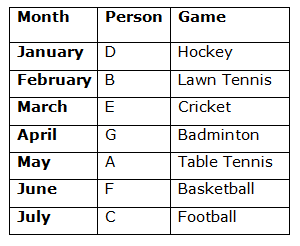
i). F is playing Basketball in the month, which contains 30 days.
ii). Only one person is playing between F and the person who is playing Badminton.
iii). The person who is playing in the month of January is playing Hockey.
iv). Only two people is playing the game between the person who is playing Cricket and the person who is playing Basketball.
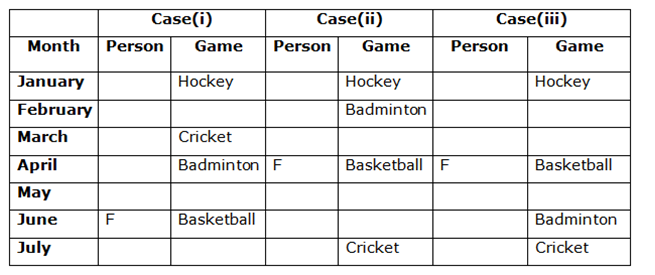
v). The person who is playing Lawn Tennis is not playing in the month which contains 31 days.
vi). The person who is playing Table Tennis is playing in one of the month before the person who is playing Football.
vii). E is playing cricket.
viii). G is playing immediately before A, who is playing in the month which contains 31 days.
ix). C is neither playing Lawn Tennis nor playing Hockey.
x). D is not playing Lawn tennis.
xi). C is not playing in the month of May.
xii). The person who is playing Badminton is not playing in any of the month after the person who is playing football.
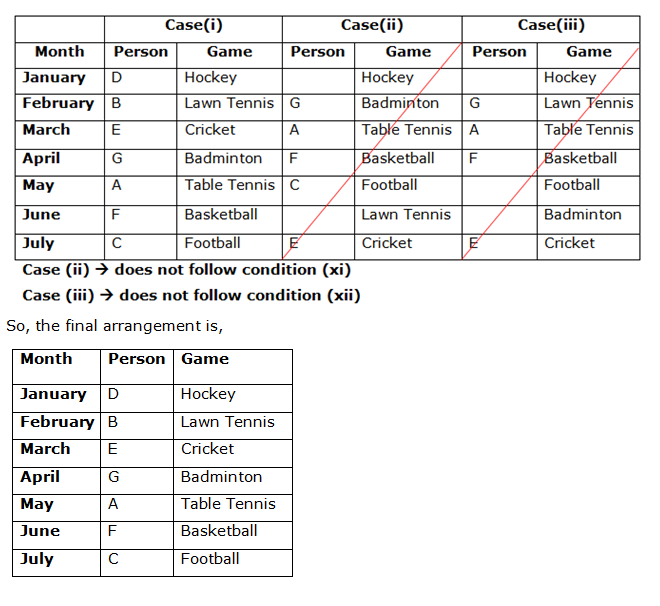
1.Answer: D
2.Answer: C
3.Answer: B
4.Answer: E
5.Answer: D
Direction (6-10):
6.Answer: E
Explanation:
254 631 784 912 327 842
245 136 478 129 237 248
7.Answer: B
Explanation:
254 631 784 912 327 842
542 631 874 921 732 842
921 874 842 732 631 542
8.Answer: A
Explanation:
254 631 784 912 327 842
452 136 478 219 723 248
9.Answer: D
Explanation:
254 631 784 912 327 842
542 631 874 921 732 842
542 631 732 842 874 921
4-1 = 3
10.Answer: A
Explanation:
254 631 784 912 327 842
245 136 478 129 237 248
478 248 245 237 136 129
Direction (11-15):
Explanation:

i). M is an only immediate neighbour of O.
ii). Only one person sits between M and Q.
iii). N sits immediate right of P, neither of them sits at extreme ends of the linear table.
iv). R sits left of P and he is not an immediate neighbour of M.
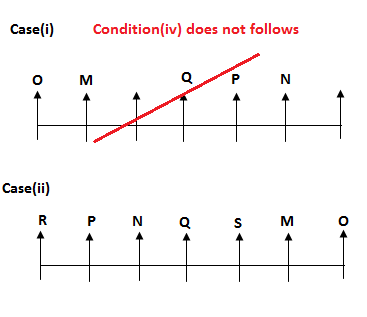
11.Answer: C
12.Answer: E
13.Answer: D
14.Answer: D
15.Answer: B
Direction (16-18):
Explanation:
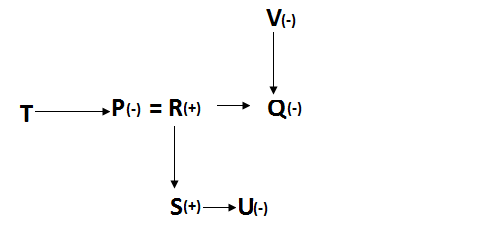
16.Answer: E
17.Answer: B
18.Answer: D
Direction (19-20):
Explanation:
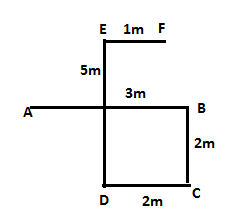
19.Answer: A
20.Answer: B
Daily Practice Test Schedule | Good Luck
| Topic | Daily Publishing Time |
| Daily News Papers & Editorials | 8.00 AM |
| Current Affairs Quiz | 9.00 AM |
| Quantitative Aptitude “20-20” | 11.00 AM |
| Vocabulary (Based on The Hindu) | 12.00 PM |
| General Awareness “20-20” | 1.00 PM |
| English Language “20-20” | 2.00 PM |
| Reasoning Puzzles & Seating | 4.00 PM |
| Daily Current Affairs Updates | 5.00 PM |
| Data Interpretation / Application Sums (Topic Wise) | 6.00 PM |
| Reasoning Ability “20-20” | 7.00 PM |
| English Language (New Pattern Questions) | 8.00 PM |





